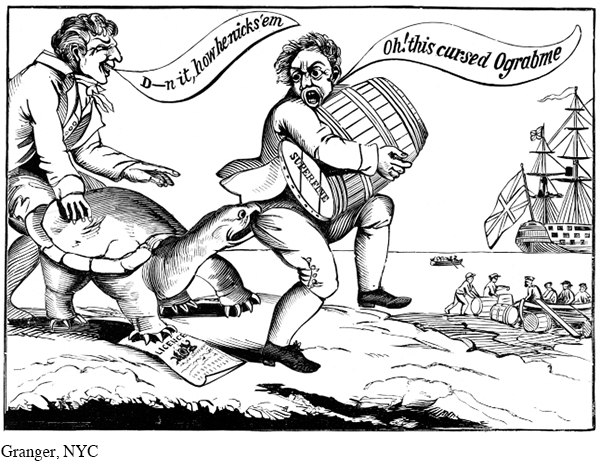Democratic-Republicans Expand Federal Powers
Although Democratic-Republicans generally opposed Marshall’s rulings, they, too, continued to expand federal power. Once again, international developments drove the Jefferson administration’s political agenda. By 1805 the security of the United States was threatened by continued conflicts between France and Great Britain. Both sought alliances with the young nation, and both ignored U.S. claims of neutrality. Indeed, each nation sought to punish Americans for trading with the other. Britain’s Royal Navy began stopping American ships carrying sugar and molasses from the French West Indies and, between 1802 and 1811, impressed more than eight thousand sailors from such ships, including many American citizens. France claimed a similar right to stop U.S. ships that continued to trade with Great Britain.
Unable to convince foreign powers to recognize U.S. neutrality, Jefferson and Madison pushed for congressional passage of an embargo that they hoped would, like colonial boycotts, force Great Britain’s hand. In 1807 Congress passed the Embargo Act, which prohibited U.S. ships from leaving their home ports until Britain and France repealed their restrictions on American trade. Although the act kept the United States out of war, it had a devastating impact on national commerce.
New England merchants immediately voiced their outrage, and some began sending goods to Europe via Canada. In response, Congress passed the Force Act, granting extraordinary powers to customs officials to end such smuggling. The economic pain caused by the rapid decline in trade spread well beyond the merchant class. Parker Cleaveland was forced to sell his home to the Bowdoin trustees and become their tenant. Farmers and urban workers as well as southern planters suffered the embargo’s effects more directly. Exports nearly stopped, and sailors and dockworkers faced escalating unemployment. With the recession deepening, American concerns about the expansion of federal power reemerged. Congress and the president had not simply regulated international trade; they had brought it to a halt.

Still, despite the failure of the Embargo Act, many Americans viewed Jefferson favorably. He had devoted his adult life to the creation of the United States. He had purchased the Louisiana Territory, opening up vast lands to American exploration and development. This geographical boon encouraged inventors and artisans to pursue ideas that would help the early republic take full advantage of its resources and recover from its current economic plight. Some must have wondered, however, how a Democratic-Republican president had so significantly expanded the power of the federal government.
REVIEW & RELATE
How did the Federalist-dominated courts and the Democratic-Republican president and Congress each contribute to the expansion of the federal government?
How did the purchase of the Louisiana Territory from France and international conflicts with France and Britain shape domestic issues in the late eighteenth and early nineteenth centuries?
Exploring American HistoriesPrinted Page 257
Exploring American Histories Value EditionPrinted Page 191
Chapter Timeline